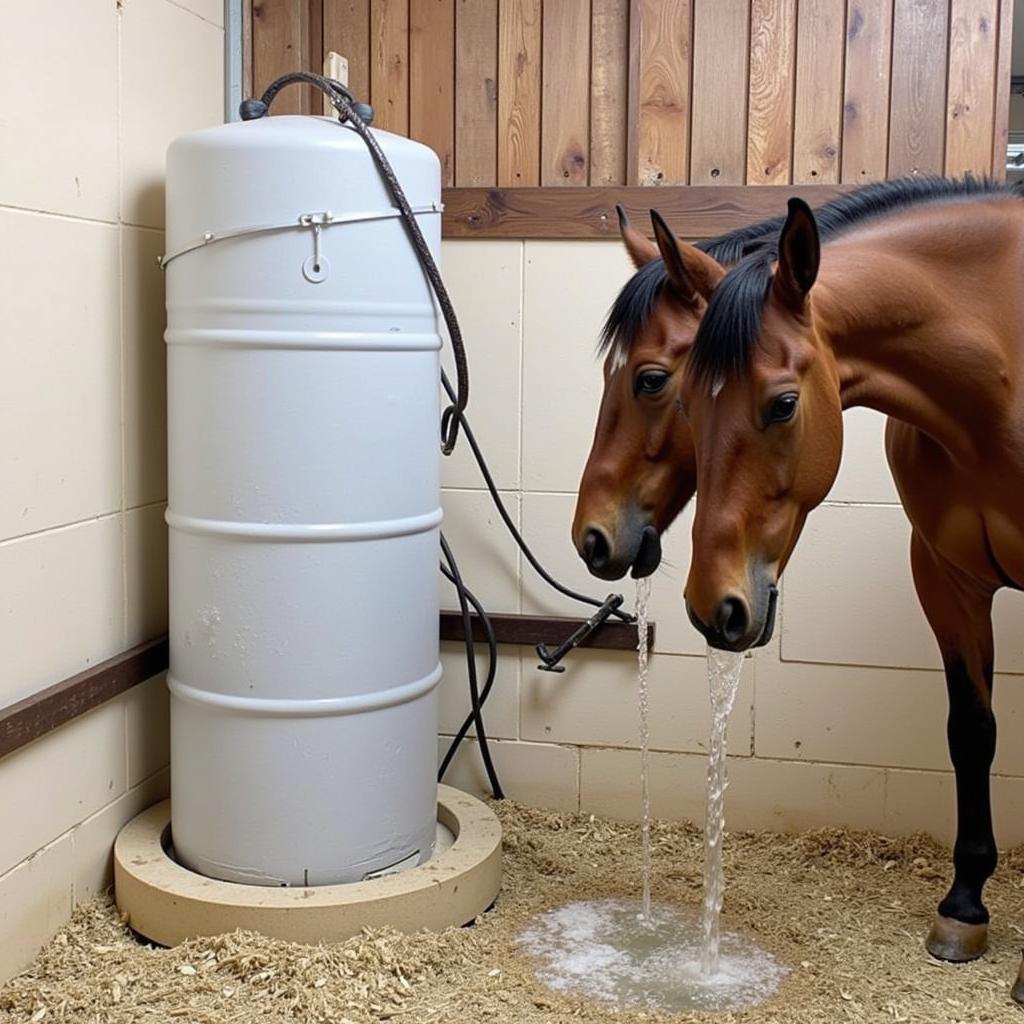Automatic Horse Stall Waterers are essential for providing a constant supply of fresh, clean water to your equine companions. They offer numerous benefits over traditional watering methods, from reducing labor to promoting better hydration. This guide will delve into everything you need to know about automatic horse stall waterers, helping you make the best choice for your stable.
Choosing the Right Automatic Horse Stall Waterer
Selecting the perfect automatic horse stall waterer requires careful consideration of various factors, including your horses’ needs, your budget, and your barn setup. There are several types available, each with its own advantages and disadvantages.
-
Float-valve waterers: These are the most common type and operate similarly to a toilet tank. A float regulates the water level, ensuring a consistent supply.
-
Heated waterers: Essential for colder climates, these waterers prevent water from freezing, ensuring your horses have access to water even in sub-zero temperatures. frost free horse waterer
-
Pressure-activated waterers: These are activated when the horse presses a paddle or lever, dispensing water on demand. This can be helpful for horses who are hesitant to drink from traditional waterers.
-
Gravity-fed waterers: These rely on a constant water supply from a tank or reservoir placed above the waterer. They are a simple and reliable option, but require regular refilling.
 Gravity Fed Automatic Horse Waterer
Gravity Fed Automatic Horse Waterer
“Choosing the right automatic waterer is crucial for equine health,” says Dr. Emily Carter, DVM, specializing in equine care. “A reliable water source encourages proper hydration and prevents various health issues.”
Installation and Maintenance of Automatic Horse Stall Waterers
Proper installation and regular maintenance are key to ensuring your automatic horse stall waterer functions correctly and provides clean, fresh water.
Installation Tips
-
Location: Choose a location that is easily accessible for your horses and convenient for you to maintain. galvanized horse troughs for sale
-
Water Lines: Ensure proper insulation and protection of water lines to prevent freezing in winter. Consider using heated water lines in extremely cold climates.
-
Height: Install the waterer at a comfortable height for your horse to drink from, typically chest level.
Maintenance Best Practices
-
Regular Cleaning: Clean the waterer regularly, removing any debris or algae buildup. This will prevent bacterial growth and ensure the water remains palatable for your horses.
-
Check for Leaks: Regularly inspect the waterer and connecting pipes for leaks to prevent water wastage and potential damage to your barn.
-
Winterization: If you live in an area with freezing temperatures, take appropriate steps to winterize your waterer to prevent damage. This may include using heated waterers or insulating existing water lines.
Benefits of Automatic Horse Stall Waterers
Automatic horse stall waterers provide several benefits for both horses and owners:
-
Consistent Water Supply: Ensures your horses always have access to fresh, clean water, promoting optimal hydration.
-
Reduced Labor: Eliminates the need for manual watering, saving you time and effort. chug horse water
-
Improved Hygiene: Reduces the risk of water contamination from spilled buckets or stagnant water.
-
Better Hydration: Encourages horses to drink more frequently, which is crucial for their overall health and performance.
“Automatic waterers significantly improve the quality of life for horses,” adds John Miller, an experienced horse trainer. “They ensure proper hydration, crucial for performance and overall well-being.”
Conclusion
Investing in an automatic horse stall waterer is a wise decision for any horse owner. It ensures a constant supply of fresh water, reduces labor, and improves the overall well-being of your horses. By considering the factors discussed in this guide and choosing the right automatic horse stall waterer for your specific needs, you can provide your equine companions with the best possible care. Remember, providing fresh, clean water is fundamental to your horse’s health and happiness.
FAQ
- How often should I clean my automatic horse stall waterer?
- What type of automatic waterer is best for cold climates?
- How high should I install an automatic waterer in my horse stall?
- Are automatic waterers suitable for all horses?
- What are the common problems with automatic waterers?
- How can I prevent my automatic waterer from freezing in winter?
- Where can I purchase an automatic horse stall waterer?
Common Scenarios
-
Scenario 1: Your horse isn’t drinking enough water. Consider switching to a different type of automatic waterer or checking for any underlying health issues.
-
Scenario 2: Your automatic waterer is leaking. Inspect the waterer and connecting pipes for any damage and repair or replace as needed.
-
Scenario 3: Your horse is playing with the waterer. Consider adding a protective guard or choosing a more robust model. ambiente friendly horse
Further Reading
For more information on horse care, visit our articles on horse motels in nebraska.
Contact us for assistance at Phone: 0772127271, Email: [email protected], or visit us at QGM2+WX2, Vị Trung, Vị Thuỷ, Hậu Giang, Việt Nam. We have a 24/7 customer support team.